The Media as a Watchdog: Role, Responsibilities, and Challenges
VerifiedAdded on 2023/06/04
|15
|3933
|460
AI Summary
This article discusses the role of the media as a watchdog in modern democracies, its responsibilities, and challenges. It covers topics such as informing the public, market regulation, the watchdog and the career, and the successes and failures of the watchdog role.
Contribute Materials
Your contribution can guide someone’s learning journey. Share your
documents today.
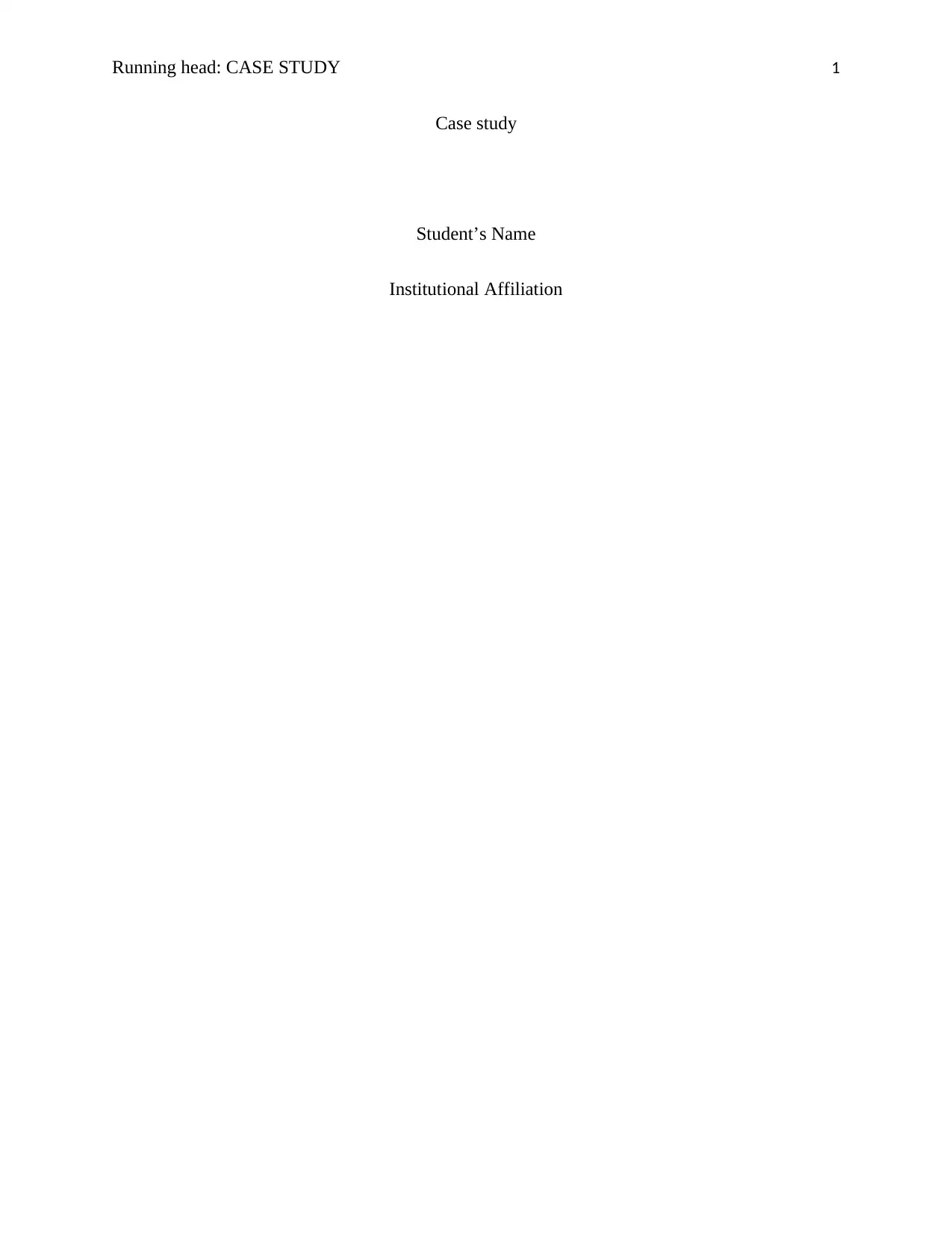
Running head: CASE STUDY 1
Case study
Student’s Name
Institutional Affiliation
Case study
Student’s Name
Institutional Affiliation
Secure Best Marks with AI Grader
Need help grading? Try our AI Grader for instant feedback on your assignments.
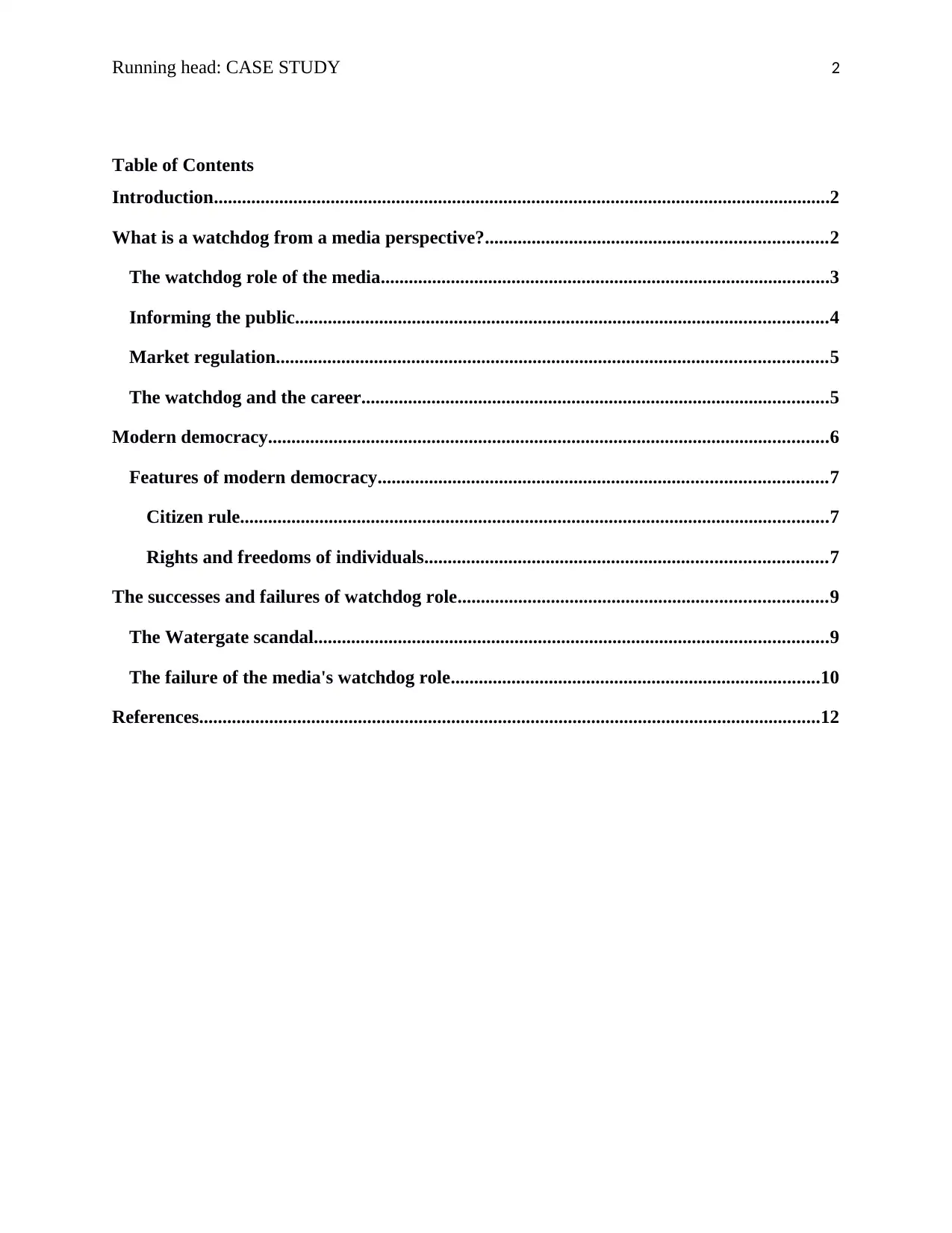
Running head: CASE STUDY 2
Table of Contents
Introduction....................................................................................................................................2
What is a watchdog from a media perspective?.........................................................................2
The watchdog role of the media................................................................................................3
Informing the public..................................................................................................................4
Market regulation......................................................................................................................5
The watchdog and the career....................................................................................................5
Modern democracy........................................................................................................................6
Features of modern democracy................................................................................................7
Citizen rule..............................................................................................................................7
Rights and freedoms of individuals......................................................................................7
The successes and failures of watchdog role...............................................................................9
The Watergate scandal..............................................................................................................9
The failure of the media's watchdog role...............................................................................10
References.....................................................................................................................................12
Table of Contents
Introduction....................................................................................................................................2
What is a watchdog from a media perspective?.........................................................................2
The watchdog role of the media................................................................................................3
Informing the public..................................................................................................................4
Market regulation......................................................................................................................5
The watchdog and the career....................................................................................................5
Modern democracy........................................................................................................................6
Features of modern democracy................................................................................................7
Citizen rule..............................................................................................................................7
Rights and freedoms of individuals......................................................................................7
The successes and failures of watchdog role...............................................................................9
The Watergate scandal..............................................................................................................9
The failure of the media's watchdog role...............................................................................10
References.....................................................................................................................................12
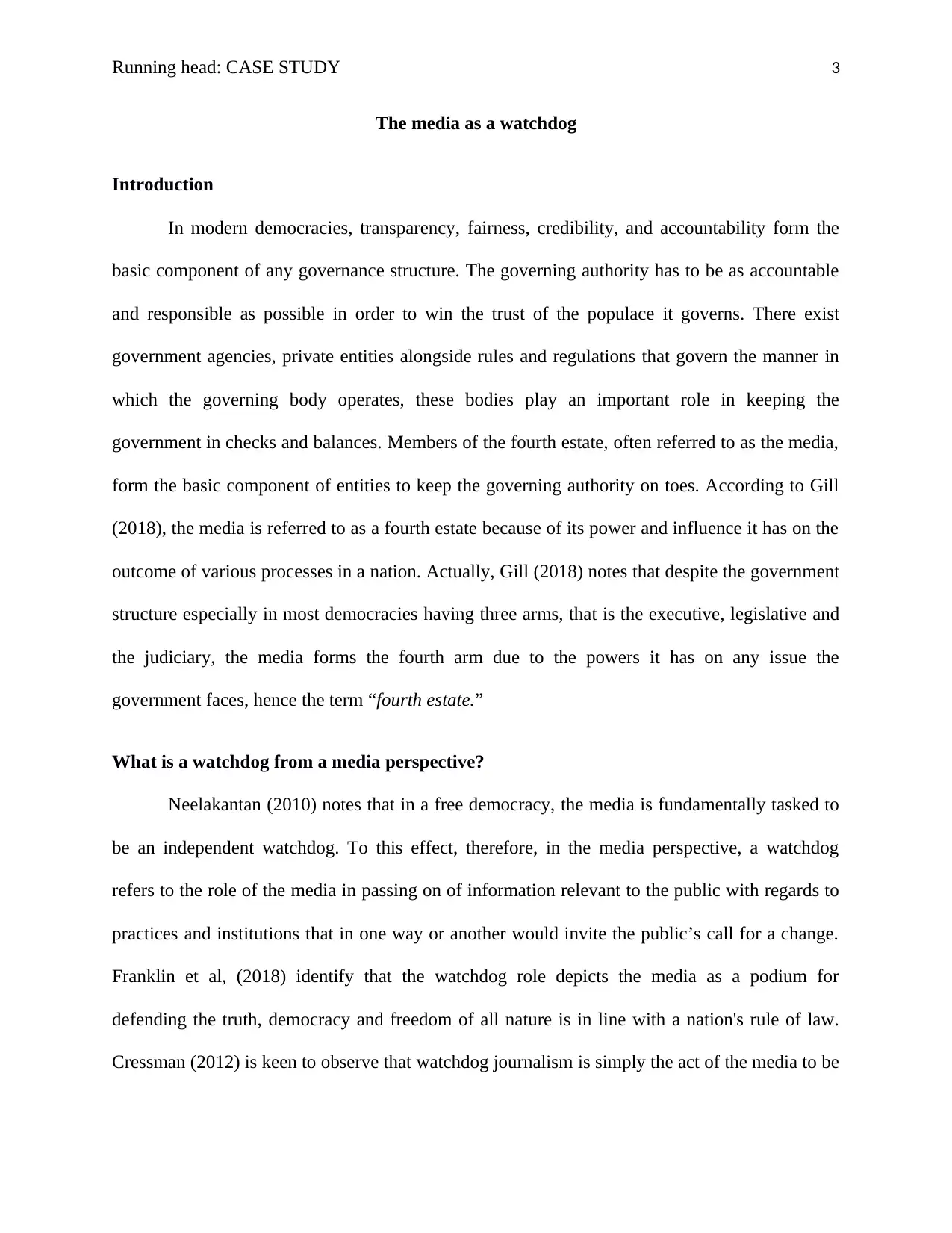
Running head: CASE STUDY 3
The media as a watchdog
Introduction
In modern democracies, transparency, fairness, credibility, and accountability form the
basic component of any governance structure. The governing authority has to be as accountable
and responsible as possible in order to win the trust of the populace it governs. There exist
government agencies, private entities alongside rules and regulations that govern the manner in
which the governing body operates, these bodies play an important role in keeping the
government in checks and balances. Members of the fourth estate, often referred to as the media,
form the basic component of entities to keep the governing authority on toes. According to Gill
(2018), the media is referred to as a fourth estate because of its power and influence it has on the
outcome of various processes in a nation. Actually, Gill (2018) notes that despite the government
structure especially in most democracies having three arms, that is the executive, legislative and
the judiciary, the media forms the fourth arm due to the powers it has on any issue the
government faces, hence the term “fourth estate.”
What is a watchdog from a media perspective?
Neelakantan (2010) notes that in a free democracy, the media is fundamentally tasked to
be an independent watchdog. To this effect, therefore, in the media perspective, a watchdog
refers to the role of the media in passing on of information relevant to the public with regards to
practices and institutions that in one way or another would invite the public’s call for a change.
Franklin et al, (2018) identify that the watchdog role depicts the media as a podium for
defending the truth, democracy and freedom of all nature is in line with a nation's rule of law.
Cressman (2012) is keen to observe that watchdog journalism is simply the act of the media to be
The media as a watchdog
Introduction
In modern democracies, transparency, fairness, credibility, and accountability form the
basic component of any governance structure. The governing authority has to be as accountable
and responsible as possible in order to win the trust of the populace it governs. There exist
government agencies, private entities alongside rules and regulations that govern the manner in
which the governing body operates, these bodies play an important role in keeping the
government in checks and balances. Members of the fourth estate, often referred to as the media,
form the basic component of entities to keep the governing authority on toes. According to Gill
(2018), the media is referred to as a fourth estate because of its power and influence it has on the
outcome of various processes in a nation. Actually, Gill (2018) notes that despite the government
structure especially in most democracies having three arms, that is the executive, legislative and
the judiciary, the media forms the fourth arm due to the powers it has on any issue the
government faces, hence the term “fourth estate.”
What is a watchdog from a media perspective?
Neelakantan (2010) notes that in a free democracy, the media is fundamentally tasked to
be an independent watchdog. To this effect, therefore, in the media perspective, a watchdog
refers to the role of the media in passing on of information relevant to the public with regards to
practices and institutions that in one way or another would invite the public’s call for a change.
Franklin et al, (2018) identify that the watchdog role depicts the media as a podium for
defending the truth, democracy and freedom of all nature is in line with a nation's rule of law.
Cressman (2012) is keen to observe that watchdog journalism is simply the act of the media to be
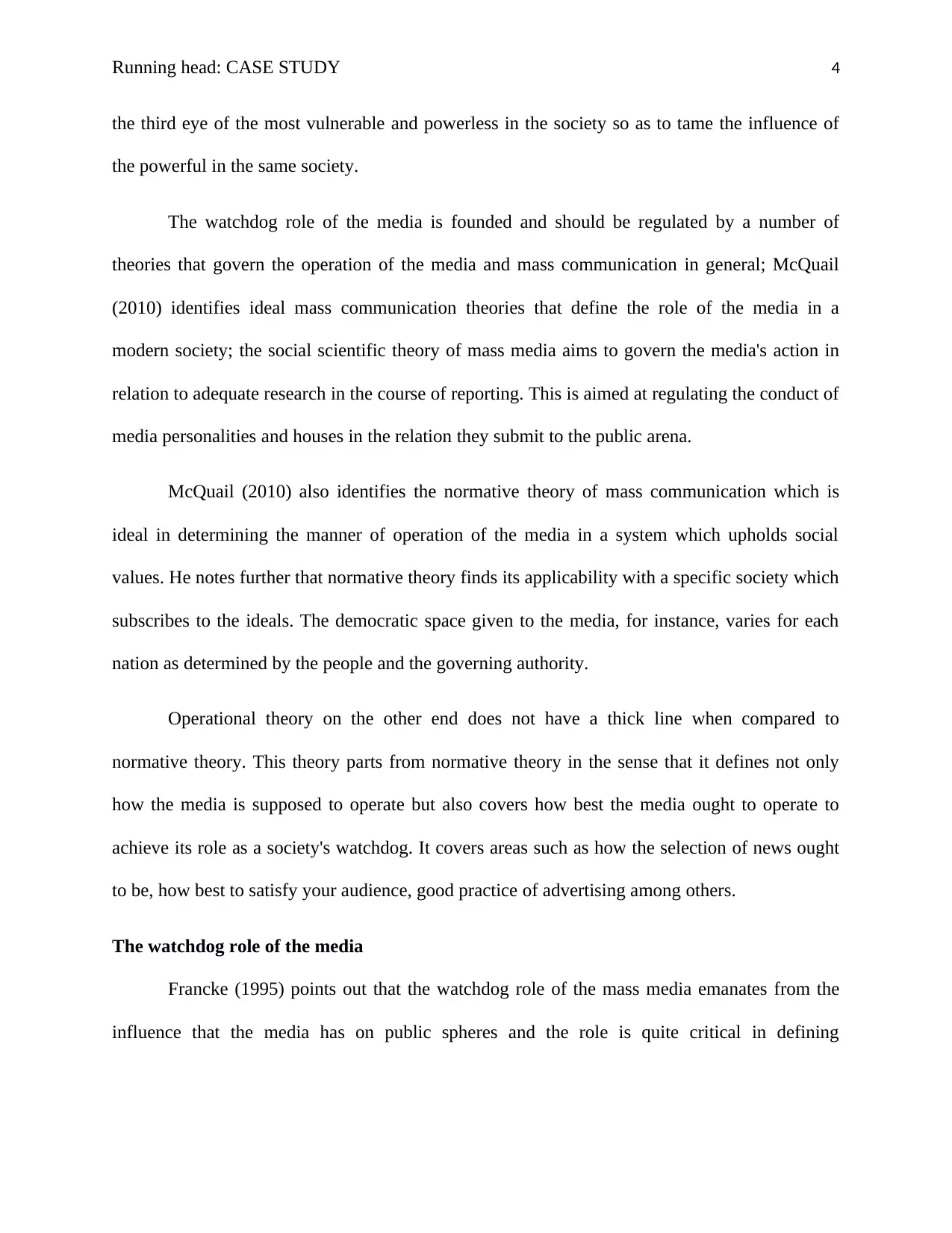
Running head: CASE STUDY 4
the third eye of the most vulnerable and powerless in the society so as to tame the influence of
the powerful in the same society.
The watchdog role of the media is founded and should be regulated by a number of
theories that govern the operation of the media and mass communication in general; McQuail
(2010) identifies ideal mass communication theories that define the role of the media in a
modern society; the social scientific theory of mass media aims to govern the media's action in
relation to adequate research in the course of reporting. This is aimed at regulating the conduct of
media personalities and houses in the relation they submit to the public arena.
McQuail (2010) also identifies the normative theory of mass communication which is
ideal in determining the manner of operation of the media in a system which upholds social
values. He notes further that normative theory finds its applicability with a specific society which
subscribes to the ideals. The democratic space given to the media, for instance, varies for each
nation as determined by the people and the governing authority.
Operational theory on the other end does not have a thick line when compared to
normative theory. This theory parts from normative theory in the sense that it defines not only
how the media is supposed to operate but also covers how best the media ought to operate to
achieve its role as a society's watchdog. It covers areas such as how the selection of news ought
to be, how best to satisfy your audience, good practice of advertising among others.
The watchdog role of the media
Francke (1995) points out that the watchdog role of the mass media emanates from the
influence that the media has on public spheres and the role is quite critical in defining
the third eye of the most vulnerable and powerless in the society so as to tame the influence of
the powerful in the same society.
The watchdog role of the media is founded and should be regulated by a number of
theories that govern the operation of the media and mass communication in general; McQuail
(2010) identifies ideal mass communication theories that define the role of the media in a
modern society; the social scientific theory of mass media aims to govern the media's action in
relation to adequate research in the course of reporting. This is aimed at regulating the conduct of
media personalities and houses in the relation they submit to the public arena.
McQuail (2010) also identifies the normative theory of mass communication which is
ideal in determining the manner of operation of the media in a system which upholds social
values. He notes further that normative theory finds its applicability with a specific society which
subscribes to the ideals. The democratic space given to the media, for instance, varies for each
nation as determined by the people and the governing authority.
Operational theory on the other end does not have a thick line when compared to
normative theory. This theory parts from normative theory in the sense that it defines not only
how the media is supposed to operate but also covers how best the media ought to operate to
achieve its role as a society's watchdog. It covers areas such as how the selection of news ought
to be, how best to satisfy your audience, good practice of advertising among others.
The watchdog role of the media
Francke (1995) points out that the watchdog role of the mass media emanates from the
influence that the media has on public spheres and the role is quite critical in defining
Secure Best Marks with AI Grader
Need help grading? Try our AI Grader for instant feedback on your assignments.
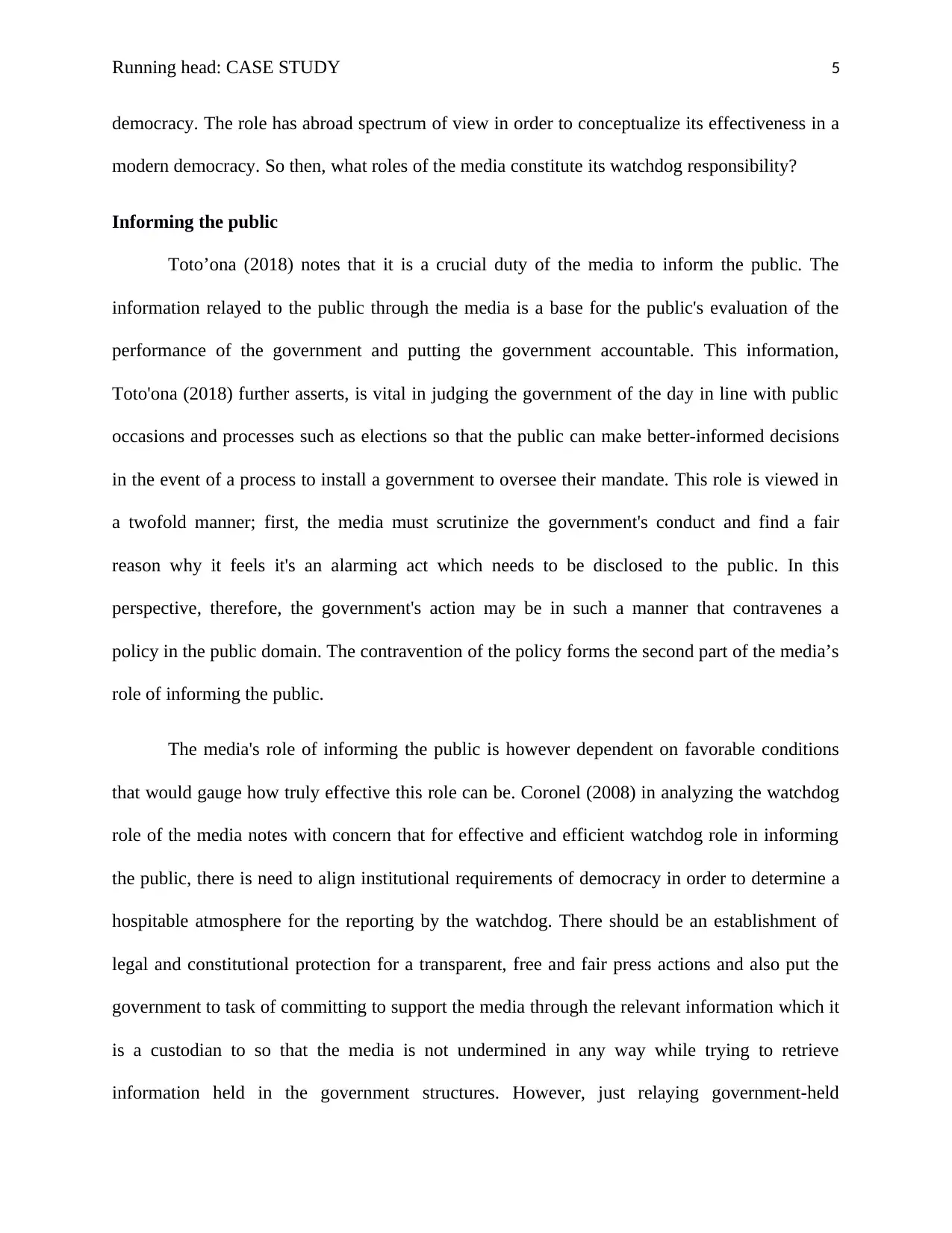
Running head: CASE STUDY 5
democracy. The role has abroad spectrum of view in order to conceptualize its effectiveness in a
modern democracy. So then, what roles of the media constitute its watchdog responsibility?
Informing the public
Toto’ona (2018) notes that it is a crucial duty of the media to inform the public. The
information relayed to the public through the media is a base for the public's evaluation of the
performance of the government and putting the government accountable. This information,
Toto'ona (2018) further asserts, is vital in judging the government of the day in line with public
occasions and processes such as elections so that the public can make better-informed decisions
in the event of a process to install a government to oversee their mandate. This role is viewed in
a twofold manner; first, the media must scrutinize the government's conduct and find a fair
reason why it feels it's an alarming act which needs to be disclosed to the public. In this
perspective, therefore, the government's action may be in such a manner that contravenes a
policy in the public domain. The contravention of the policy forms the second part of the media’s
role of informing the public.
The media's role of informing the public is however dependent on favorable conditions
that would gauge how truly effective this role can be. Coronel (2008) in analyzing the watchdog
role of the media notes with concern that for effective and efficient watchdog role in informing
the public, there is need to align institutional requirements of democracy in order to determine a
hospitable atmosphere for the reporting by the watchdog. There should be an establishment of
legal and constitutional protection for a transparent, free and fair press actions and also put the
government to task of committing to support the media through the relevant information which it
is a custodian to so that the media is not undermined in any way while trying to retrieve
information held in the government structures. However, just relaying government-held
democracy. The role has abroad spectrum of view in order to conceptualize its effectiveness in a
modern democracy. So then, what roles of the media constitute its watchdog responsibility?
Informing the public
Toto’ona (2018) notes that it is a crucial duty of the media to inform the public. The
information relayed to the public through the media is a base for the public's evaluation of the
performance of the government and putting the government accountable. This information,
Toto'ona (2018) further asserts, is vital in judging the government of the day in line with public
occasions and processes such as elections so that the public can make better-informed decisions
in the event of a process to install a government to oversee their mandate. This role is viewed in
a twofold manner; first, the media must scrutinize the government's conduct and find a fair
reason why it feels it's an alarming act which needs to be disclosed to the public. In this
perspective, therefore, the government's action may be in such a manner that contravenes a
policy in the public domain. The contravention of the policy forms the second part of the media’s
role of informing the public.
The media's role of informing the public is however dependent on favorable conditions
that would gauge how truly effective this role can be. Coronel (2008) in analyzing the watchdog
role of the media notes with concern that for effective and efficient watchdog role in informing
the public, there is need to align institutional requirements of democracy in order to determine a
hospitable atmosphere for the reporting by the watchdog. There should be an establishment of
legal and constitutional protection for a transparent, free and fair press actions and also put the
government to task of committing to support the media through the relevant information which it
is a custodian to so that the media is not undermined in any way while trying to retrieve
information held in the government structures. However, just relaying government-held
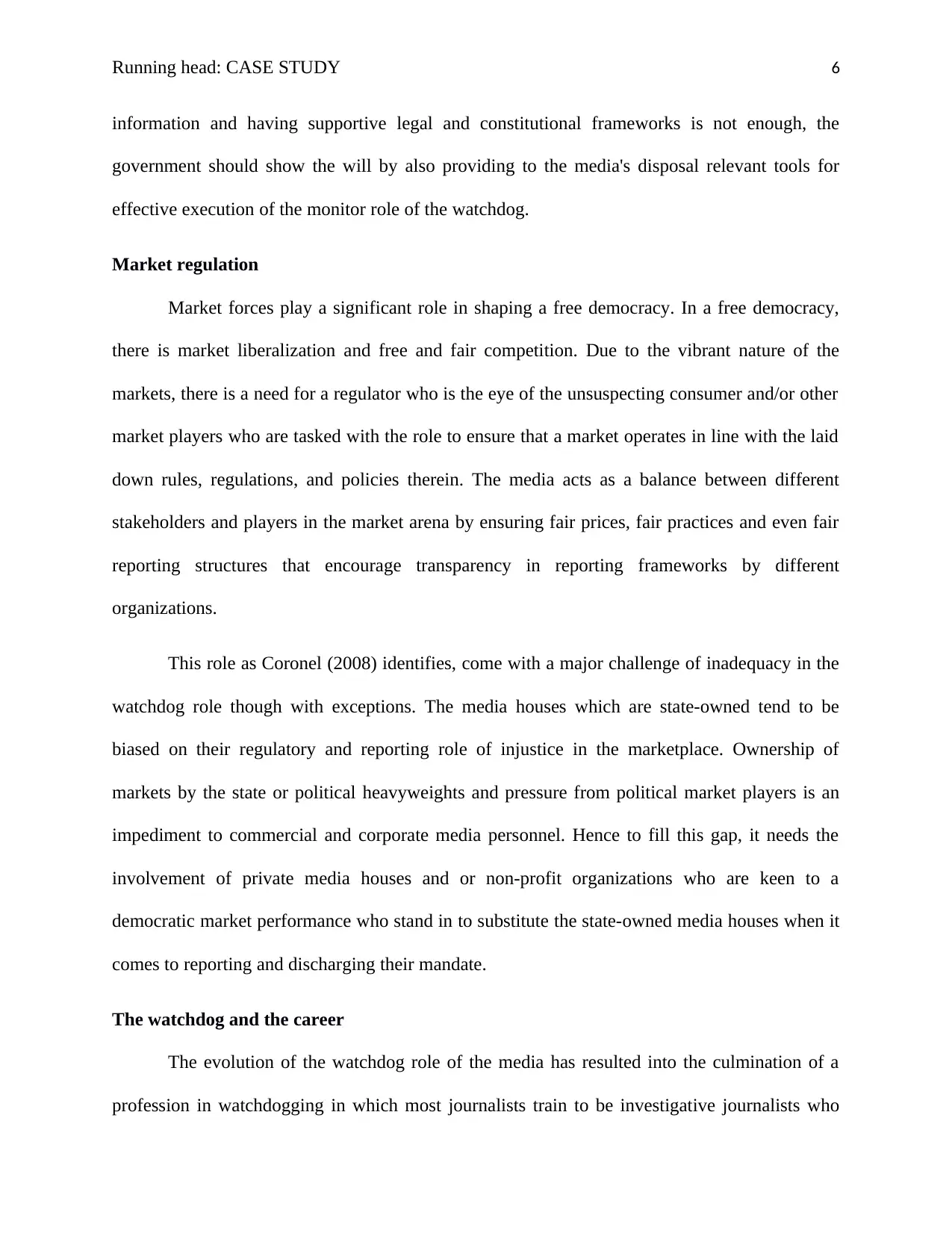
Running head: CASE STUDY 6
information and having supportive legal and constitutional frameworks is not enough, the
government should show the will by also providing to the media's disposal relevant tools for
effective execution of the monitor role of the watchdog.
Market regulation
Market forces play a significant role in shaping a free democracy. In a free democracy,
there is market liberalization and free and fair competition. Due to the vibrant nature of the
markets, there is a need for a regulator who is the eye of the unsuspecting consumer and/or other
market players who are tasked with the role to ensure that a market operates in line with the laid
down rules, regulations, and policies therein. The media acts as a balance between different
stakeholders and players in the market arena by ensuring fair prices, fair practices and even fair
reporting structures that encourage transparency in reporting frameworks by different
organizations.
This role as Coronel (2008) identifies, come with a major challenge of inadequacy in the
watchdog role though with exceptions. The media houses which are state-owned tend to be
biased on their regulatory and reporting role of injustice in the marketplace. Ownership of
markets by the state or political heavyweights and pressure from political market players is an
impediment to commercial and corporate media personnel. Hence to fill this gap, it needs the
involvement of private media houses and or non-profit organizations who are keen to a
democratic market performance who stand in to substitute the state-owned media houses when it
comes to reporting and discharging their mandate.
The watchdog and the career
The evolution of the watchdog role of the media has resulted into the culmination of a
profession in watchdogging in which most journalists train to be investigative journalists who
information and having supportive legal and constitutional frameworks is not enough, the
government should show the will by also providing to the media's disposal relevant tools for
effective execution of the monitor role of the watchdog.
Market regulation
Market forces play a significant role in shaping a free democracy. In a free democracy,
there is market liberalization and free and fair competition. Due to the vibrant nature of the
markets, there is a need for a regulator who is the eye of the unsuspecting consumer and/or other
market players who are tasked with the role to ensure that a market operates in line with the laid
down rules, regulations, and policies therein. The media acts as a balance between different
stakeholders and players in the market arena by ensuring fair prices, fair practices and even fair
reporting structures that encourage transparency in reporting frameworks by different
organizations.
This role as Coronel (2008) identifies, come with a major challenge of inadequacy in the
watchdog role though with exceptions. The media houses which are state-owned tend to be
biased on their regulatory and reporting role of injustice in the marketplace. Ownership of
markets by the state or political heavyweights and pressure from political market players is an
impediment to commercial and corporate media personnel. Hence to fill this gap, it needs the
involvement of private media houses and or non-profit organizations who are keen to a
democratic market performance who stand in to substitute the state-owned media houses when it
comes to reporting and discharging their mandate.
The watchdog and the career
The evolution of the watchdog role of the media has resulted into the culmination of a
profession in watchdogging in which most journalists train to be investigative journalists who
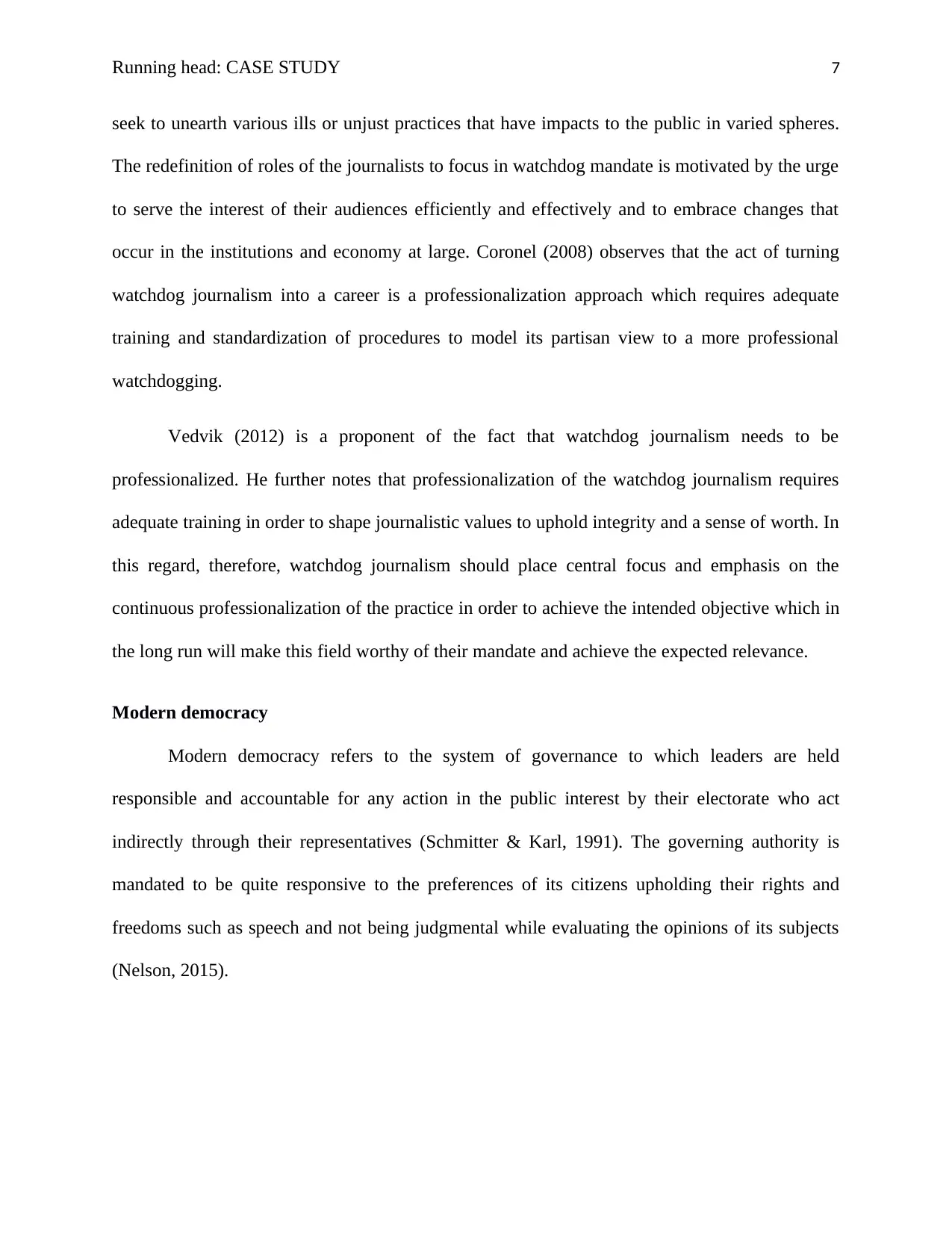
Running head: CASE STUDY 7
seek to unearth various ills or unjust practices that have impacts to the public in varied spheres.
The redefinition of roles of the journalists to focus in watchdog mandate is motivated by the urge
to serve the interest of their audiences efficiently and effectively and to embrace changes that
occur in the institutions and economy at large. Coronel (2008) observes that the act of turning
watchdog journalism into a career is a professionalization approach which requires adequate
training and standardization of procedures to model its partisan view to a more professional
watchdogging.
Vedvik (2012) is a proponent of the fact that watchdog journalism needs to be
professionalized. He further notes that professionalization of the watchdog journalism requires
adequate training in order to shape journalistic values to uphold integrity and a sense of worth. In
this regard, therefore, watchdog journalism should place central focus and emphasis on the
continuous professionalization of the practice in order to achieve the intended objective which in
the long run will make this field worthy of their mandate and achieve the expected relevance.
Modern democracy
Modern democracy refers to the system of governance to which leaders are held
responsible and accountable for any action in the public interest by their electorate who act
indirectly through their representatives (Schmitter & Karl, 1991). The governing authority is
mandated to be quite responsive to the preferences of its citizens upholding their rights and
freedoms such as speech and not being judgmental while evaluating the opinions of its subjects
(Nelson, 2015).
seek to unearth various ills or unjust practices that have impacts to the public in varied spheres.
The redefinition of roles of the journalists to focus in watchdog mandate is motivated by the urge
to serve the interest of their audiences efficiently and effectively and to embrace changes that
occur in the institutions and economy at large. Coronel (2008) observes that the act of turning
watchdog journalism into a career is a professionalization approach which requires adequate
training and standardization of procedures to model its partisan view to a more professional
watchdogging.
Vedvik (2012) is a proponent of the fact that watchdog journalism needs to be
professionalized. He further notes that professionalization of the watchdog journalism requires
adequate training in order to shape journalistic values to uphold integrity and a sense of worth. In
this regard, therefore, watchdog journalism should place central focus and emphasis on the
continuous professionalization of the practice in order to achieve the intended objective which in
the long run will make this field worthy of their mandate and achieve the expected relevance.
Modern democracy
Modern democracy refers to the system of governance to which leaders are held
responsible and accountable for any action in the public interest by their electorate who act
indirectly through their representatives (Schmitter & Karl, 1991). The governing authority is
mandated to be quite responsive to the preferences of its citizens upholding their rights and
freedoms such as speech and not being judgmental while evaluating the opinions of its subjects
(Nelson, 2015).
Paraphrase This Document
Need a fresh take? Get an instant paraphrase of this document with our AI Paraphraser
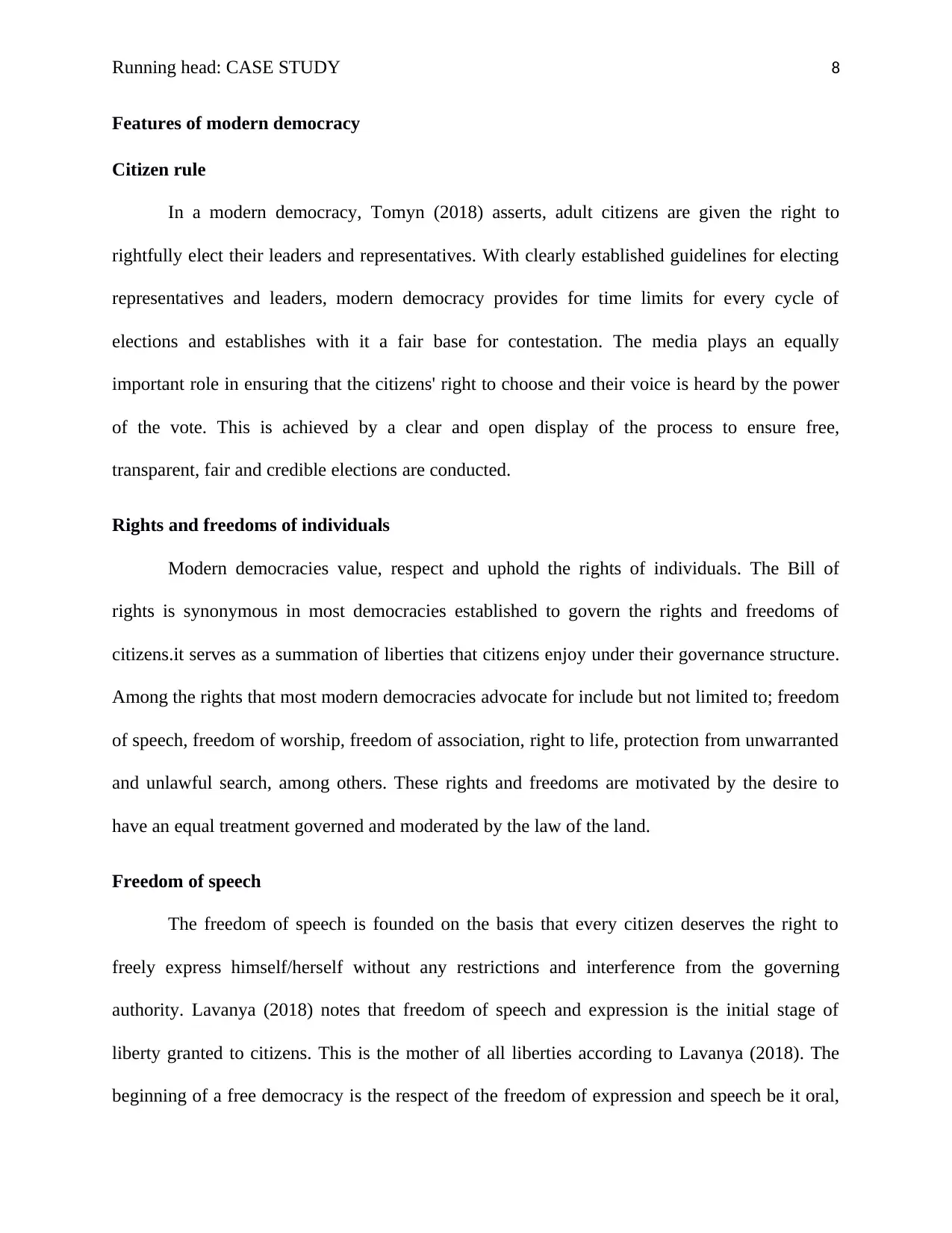
Running head: CASE STUDY 8
Features of modern democracy
Citizen rule
In a modern democracy, Tomyn (2018) asserts, adult citizens are given the right to
rightfully elect their leaders and representatives. With clearly established guidelines for electing
representatives and leaders, modern democracy provides for time limits for every cycle of
elections and establishes with it a fair base for contestation. The media plays an equally
important role in ensuring that the citizens' right to choose and their voice is heard by the power
of the vote. This is achieved by a clear and open display of the process to ensure free,
transparent, fair and credible elections are conducted.
Rights and freedoms of individuals
Modern democracies value, respect and uphold the rights of individuals. The Bill of
rights is synonymous in most democracies established to govern the rights and freedoms of
citizens.it serves as a summation of liberties that citizens enjoy under their governance structure.
Among the rights that most modern democracies advocate for include but not limited to; freedom
of speech, freedom of worship, freedom of association, right to life, protection from unwarranted
and unlawful search, among others. These rights and freedoms are motivated by the desire to
have an equal treatment governed and moderated by the law of the land.
Freedom of speech
The freedom of speech is founded on the basis that every citizen deserves the right to
freely express himself/herself without any restrictions and interference from the governing
authority. Lavanya (2018) notes that freedom of speech and expression is the initial stage of
liberty granted to citizens. This is the mother of all liberties according to Lavanya (2018). The
beginning of a free democracy is the respect of the freedom of expression and speech be it oral,
Features of modern democracy
Citizen rule
In a modern democracy, Tomyn (2018) asserts, adult citizens are given the right to
rightfully elect their leaders and representatives. With clearly established guidelines for electing
representatives and leaders, modern democracy provides for time limits for every cycle of
elections and establishes with it a fair base for contestation. The media plays an equally
important role in ensuring that the citizens' right to choose and their voice is heard by the power
of the vote. This is achieved by a clear and open display of the process to ensure free,
transparent, fair and credible elections are conducted.
Rights and freedoms of individuals
Modern democracies value, respect and uphold the rights of individuals. The Bill of
rights is synonymous in most democracies established to govern the rights and freedoms of
citizens.it serves as a summation of liberties that citizens enjoy under their governance structure.
Among the rights that most modern democracies advocate for include but not limited to; freedom
of speech, freedom of worship, freedom of association, right to life, protection from unwarranted
and unlawful search, among others. These rights and freedoms are motivated by the desire to
have an equal treatment governed and moderated by the law of the land.
Freedom of speech
The freedom of speech is founded on the basis that every citizen deserves the right to
freely express himself/herself without any restrictions and interference from the governing
authority. Lavanya (2018) notes that freedom of speech and expression is the initial stage of
liberty granted to citizens. This is the mother of all liberties according to Lavanya (2018). The
beginning of a free democracy is the respect of the freedom of expression and speech be it oral,
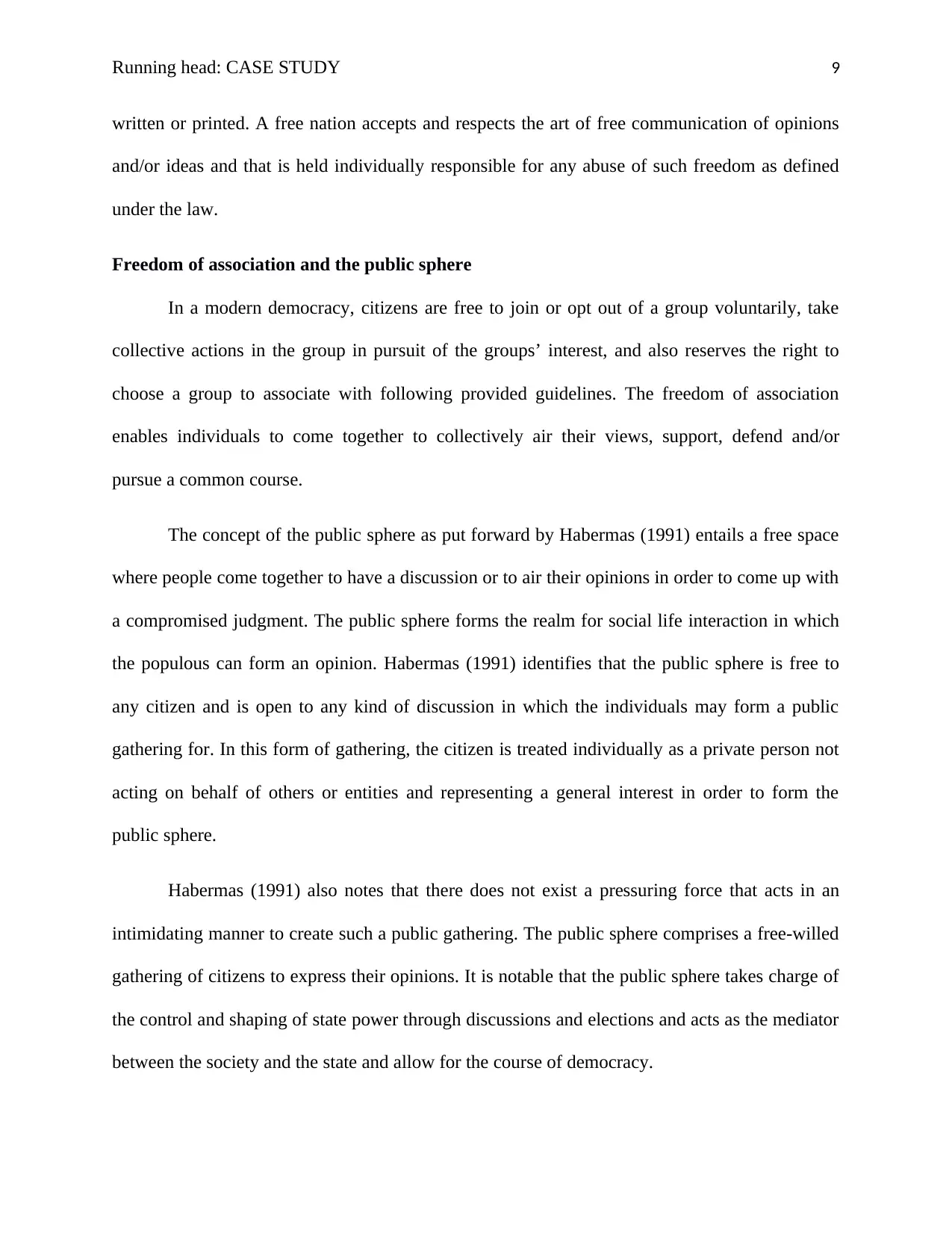
Running head: CASE STUDY 9
written or printed. A free nation accepts and respects the art of free communication of opinions
and/or ideas and that is held individually responsible for any abuse of such freedom as defined
under the law.
Freedom of association and the public sphere
In a modern democracy, citizens are free to join or opt out of a group voluntarily, take
collective actions in the group in pursuit of the groups’ interest, and also reserves the right to
choose a group to associate with following provided guidelines. The freedom of association
enables individuals to come together to collectively air their views, support, defend and/or
pursue a common course.
The concept of the public sphere as put forward by Habermas (1991) entails a free space
where people come together to have a discussion or to air their opinions in order to come up with
a compromised judgment. The public sphere forms the realm for social life interaction in which
the populous can form an opinion. Habermas (1991) identifies that the public sphere is free to
any citizen and is open to any kind of discussion in which the individuals may form a public
gathering for. In this form of gathering, the citizen is treated individually as a private person not
acting on behalf of others or entities and representing a general interest in order to form the
public sphere.
Habermas (1991) also notes that there does not exist a pressuring force that acts in an
intimidating manner to create such a public gathering. The public sphere comprises a free-willed
gathering of citizens to express their opinions. It is notable that the public sphere takes charge of
the control and shaping of state power through discussions and elections and acts as the mediator
between the society and the state and allow for the course of democracy.
written or printed. A free nation accepts and respects the art of free communication of opinions
and/or ideas and that is held individually responsible for any abuse of such freedom as defined
under the law.
Freedom of association and the public sphere
In a modern democracy, citizens are free to join or opt out of a group voluntarily, take
collective actions in the group in pursuit of the groups’ interest, and also reserves the right to
choose a group to associate with following provided guidelines. The freedom of association
enables individuals to come together to collectively air their views, support, defend and/or
pursue a common course.
The concept of the public sphere as put forward by Habermas (1991) entails a free space
where people come together to have a discussion or to air their opinions in order to come up with
a compromised judgment. The public sphere forms the realm for social life interaction in which
the populous can form an opinion. Habermas (1991) identifies that the public sphere is free to
any citizen and is open to any kind of discussion in which the individuals may form a public
gathering for. In this form of gathering, the citizen is treated individually as a private person not
acting on behalf of others or entities and representing a general interest in order to form the
public sphere.
Habermas (1991) also notes that there does not exist a pressuring force that acts in an
intimidating manner to create such a public gathering. The public sphere comprises a free-willed
gathering of citizens to express their opinions. It is notable that the public sphere takes charge of
the control and shaping of state power through discussions and elections and acts as the mediator
between the society and the state and allow for the course of democracy.
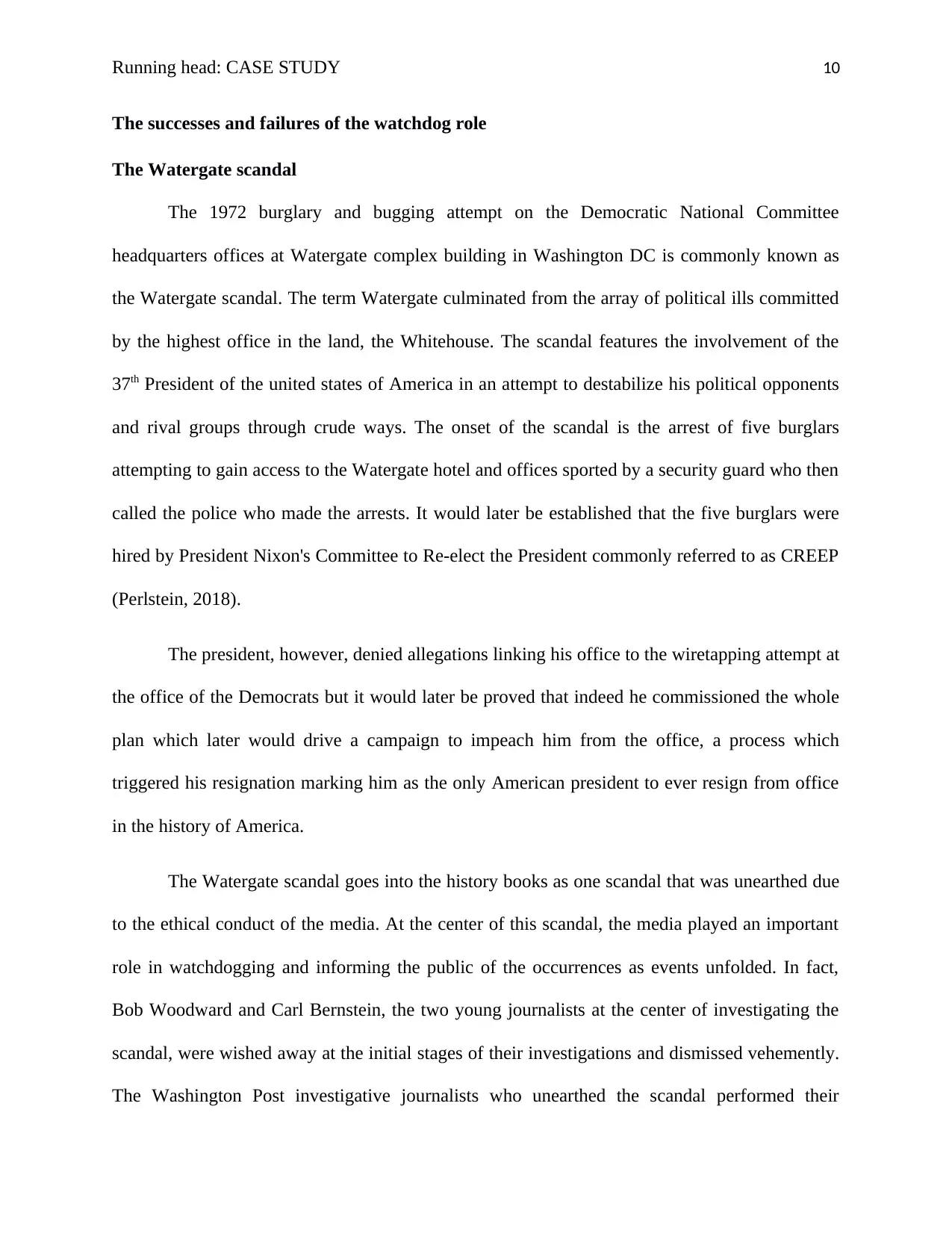
Running head: CASE STUDY 10
The successes and failures of the watchdog role
The Watergate scandal
The 1972 burglary and bugging attempt on the Democratic National Committee
headquarters offices at Watergate complex building in Washington DC is commonly known as
the Watergate scandal. The term Watergate culminated from the array of political ills committed
by the highest office in the land, the Whitehouse. The scandal features the involvement of the
37th President of the united states of America in an attempt to destabilize his political opponents
and rival groups through crude ways. The onset of the scandal is the arrest of five burglars
attempting to gain access to the Watergate hotel and offices sported by a security guard who then
called the police who made the arrests. It would later be established that the five burglars were
hired by President Nixon's Committee to Re-elect the President commonly referred to as CREEP
(Perlstein, 2018).
The president, however, denied allegations linking his office to the wiretapping attempt at
the office of the Democrats but it would later be proved that indeed he commissioned the whole
plan which later would drive a campaign to impeach him from the office, a process which
triggered his resignation marking him as the only American president to ever resign from office
in the history of America.
The Watergate scandal goes into the history books as one scandal that was unearthed due
to the ethical conduct of the media. At the center of this scandal, the media played an important
role in watchdogging and informing the public of the occurrences as events unfolded. In fact,
Bob Woodward and Carl Bernstein, the two young journalists at the center of investigating the
scandal, were wished away at the initial stages of their investigations and dismissed vehemently.
The Washington Post investigative journalists who unearthed the scandal performed their
The successes and failures of the watchdog role
The Watergate scandal
The 1972 burglary and bugging attempt on the Democratic National Committee
headquarters offices at Watergate complex building in Washington DC is commonly known as
the Watergate scandal. The term Watergate culminated from the array of political ills committed
by the highest office in the land, the Whitehouse. The scandal features the involvement of the
37th President of the united states of America in an attempt to destabilize his political opponents
and rival groups through crude ways. The onset of the scandal is the arrest of five burglars
attempting to gain access to the Watergate hotel and offices sported by a security guard who then
called the police who made the arrests. It would later be established that the five burglars were
hired by President Nixon's Committee to Re-elect the President commonly referred to as CREEP
(Perlstein, 2018).
The president, however, denied allegations linking his office to the wiretapping attempt at
the office of the Democrats but it would later be proved that indeed he commissioned the whole
plan which later would drive a campaign to impeach him from the office, a process which
triggered his resignation marking him as the only American president to ever resign from office
in the history of America.
The Watergate scandal goes into the history books as one scandal that was unearthed due
to the ethical conduct of the media. At the center of this scandal, the media played an important
role in watchdogging and informing the public of the occurrences as events unfolded. In fact,
Bob Woodward and Carl Bernstein, the two young journalists at the center of investigating the
scandal, were wished away at the initial stages of their investigations and dismissed vehemently.
The Washington Post investigative journalists who unearthed the scandal performed their
Secure Best Marks with AI Grader
Need help grading? Try our AI Grader for instant feedback on your assignments.
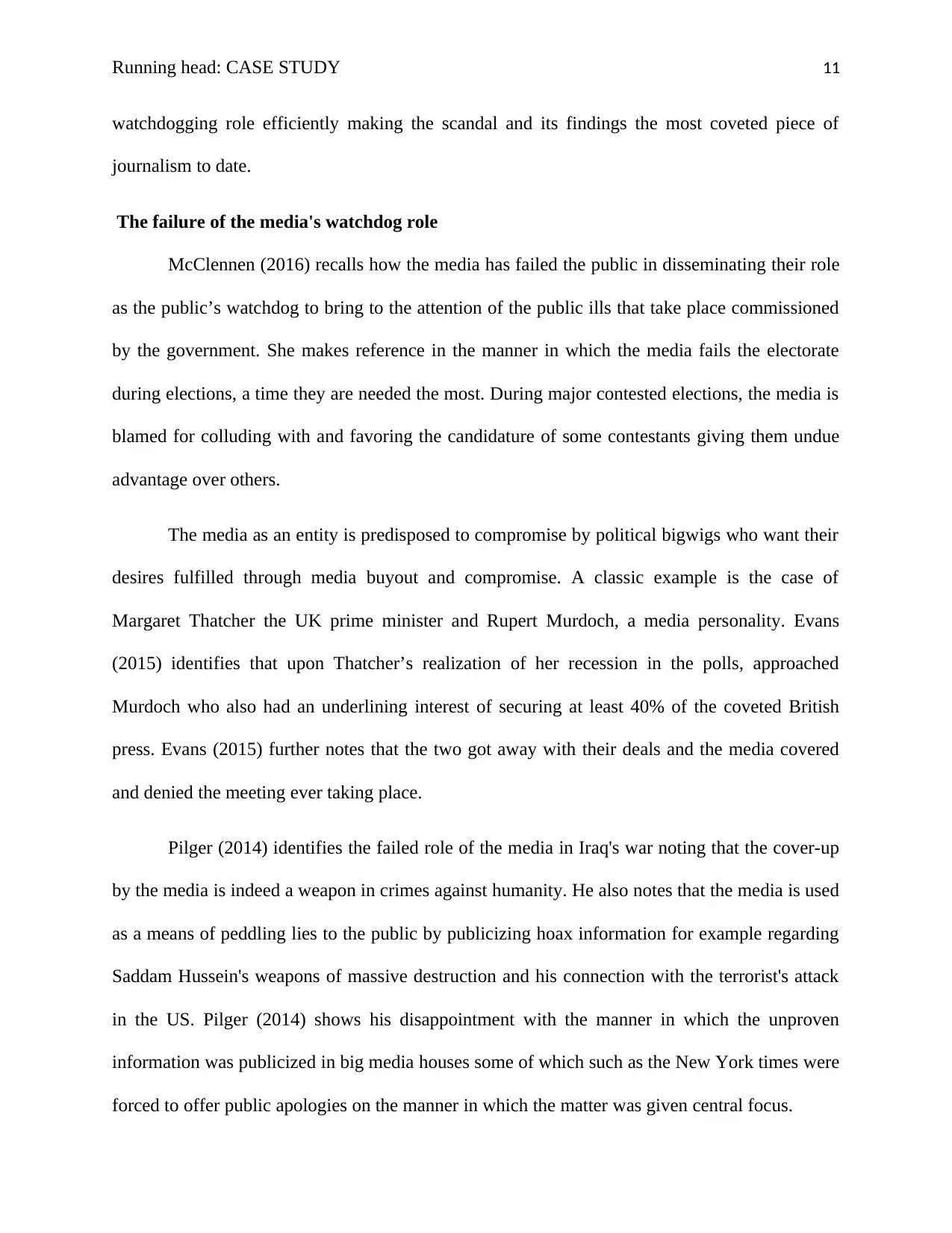
Running head: CASE STUDY 11
watchdogging role efficiently making the scandal and its findings the most coveted piece of
journalism to date.
The failure of the media's watchdog role
McClennen (2016) recalls how the media has failed the public in disseminating their role
as the public’s watchdog to bring to the attention of the public ills that take place commissioned
by the government. She makes reference in the manner in which the media fails the electorate
during elections, a time they are needed the most. During major contested elections, the media is
blamed for colluding with and favoring the candidature of some contestants giving them undue
advantage over others.
The media as an entity is predisposed to compromise by political bigwigs who want their
desires fulfilled through media buyout and compromise. A classic example is the case of
Margaret Thatcher the UK prime minister and Rupert Murdoch, a media personality. Evans
(2015) identifies that upon Thatcher’s realization of her recession in the polls, approached
Murdoch who also had an underlining interest of securing at least 40% of the coveted British
press. Evans (2015) further notes that the two got away with their deals and the media covered
and denied the meeting ever taking place.
Pilger (2014) identifies the failed role of the media in Iraq's war noting that the cover-up
by the media is indeed a weapon in crimes against humanity. He also notes that the media is used
as a means of peddling lies to the public by publicizing hoax information for example regarding
Saddam Hussein's weapons of massive destruction and his connection with the terrorist's attack
in the US. Pilger (2014) shows his disappointment with the manner in which the unproven
information was publicized in big media houses some of which such as the New York times were
forced to offer public apologies on the manner in which the matter was given central focus.
watchdogging role efficiently making the scandal and its findings the most coveted piece of
journalism to date.
The failure of the media's watchdog role
McClennen (2016) recalls how the media has failed the public in disseminating their role
as the public’s watchdog to bring to the attention of the public ills that take place commissioned
by the government. She makes reference in the manner in which the media fails the electorate
during elections, a time they are needed the most. During major contested elections, the media is
blamed for colluding with and favoring the candidature of some contestants giving them undue
advantage over others.
The media as an entity is predisposed to compromise by political bigwigs who want their
desires fulfilled through media buyout and compromise. A classic example is the case of
Margaret Thatcher the UK prime minister and Rupert Murdoch, a media personality. Evans
(2015) identifies that upon Thatcher’s realization of her recession in the polls, approached
Murdoch who also had an underlining interest of securing at least 40% of the coveted British
press. Evans (2015) further notes that the two got away with their deals and the media covered
and denied the meeting ever taking place.
Pilger (2014) identifies the failed role of the media in Iraq's war noting that the cover-up
by the media is indeed a weapon in crimes against humanity. He also notes that the media is used
as a means of peddling lies to the public by publicizing hoax information for example regarding
Saddam Hussein's weapons of massive destruction and his connection with the terrorist's attack
in the US. Pilger (2014) shows his disappointment with the manner in which the unproven
information was publicized in big media houses some of which such as the New York times were
forced to offer public apologies on the manner in which the matter was given central focus.
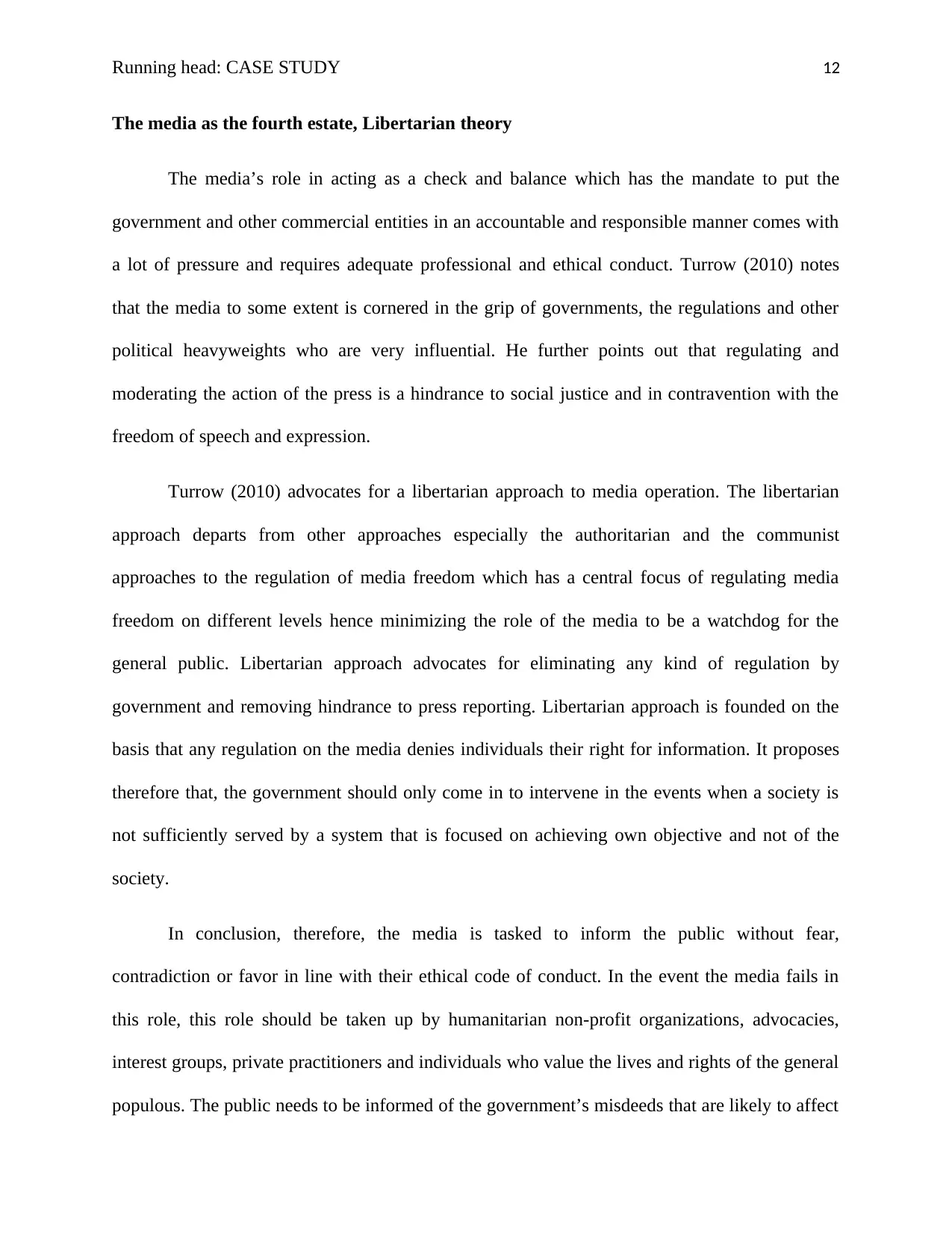
Running head: CASE STUDY 12
The media as the fourth estate, Libertarian theory
The media’s role in acting as a check and balance which has the mandate to put the
government and other commercial entities in an accountable and responsible manner comes with
a lot of pressure and requires adequate professional and ethical conduct. Turrow (2010) notes
that the media to some extent is cornered in the grip of governments, the regulations and other
political heavyweights who are very influential. He further points out that regulating and
moderating the action of the press is a hindrance to social justice and in contravention with the
freedom of speech and expression.
Turrow (2010) advocates for a libertarian approach to media operation. The libertarian
approach departs from other approaches especially the authoritarian and the communist
approaches to the regulation of media freedom which has a central focus of regulating media
freedom on different levels hence minimizing the role of the media to be a watchdog for the
general public. Libertarian approach advocates for eliminating any kind of regulation by
government and removing hindrance to press reporting. Libertarian approach is founded on the
basis that any regulation on the media denies individuals their right for information. It proposes
therefore that, the government should only come in to intervene in the events when a society is
not sufficiently served by a system that is focused on achieving own objective and not of the
society.
In conclusion, therefore, the media is tasked to inform the public without fear,
contradiction or favor in line with their ethical code of conduct. In the event the media fails in
this role, this role should be taken up by humanitarian non-profit organizations, advocacies,
interest groups, private practitioners and individuals who value the lives and rights of the general
populous. The public needs to be informed of the government’s misdeeds that are likely to affect
The media as the fourth estate, Libertarian theory
The media’s role in acting as a check and balance which has the mandate to put the
government and other commercial entities in an accountable and responsible manner comes with
a lot of pressure and requires adequate professional and ethical conduct. Turrow (2010) notes
that the media to some extent is cornered in the grip of governments, the regulations and other
political heavyweights who are very influential. He further points out that regulating and
moderating the action of the press is a hindrance to social justice and in contravention with the
freedom of speech and expression.
Turrow (2010) advocates for a libertarian approach to media operation. The libertarian
approach departs from other approaches especially the authoritarian and the communist
approaches to the regulation of media freedom which has a central focus of regulating media
freedom on different levels hence minimizing the role of the media to be a watchdog for the
general public. Libertarian approach advocates for eliminating any kind of regulation by
government and removing hindrance to press reporting. Libertarian approach is founded on the
basis that any regulation on the media denies individuals their right for information. It proposes
therefore that, the government should only come in to intervene in the events when a society is
not sufficiently served by a system that is focused on achieving own objective and not of the
society.
In conclusion, therefore, the media is tasked to inform the public without fear,
contradiction or favor in line with their ethical code of conduct. In the event the media fails in
this role, this role should be taken up by humanitarian non-profit organizations, advocacies,
interest groups, private practitioners and individuals who value the lives and rights of the general
populous. The public needs to be informed of the government’s misdeeds that are likely to affect
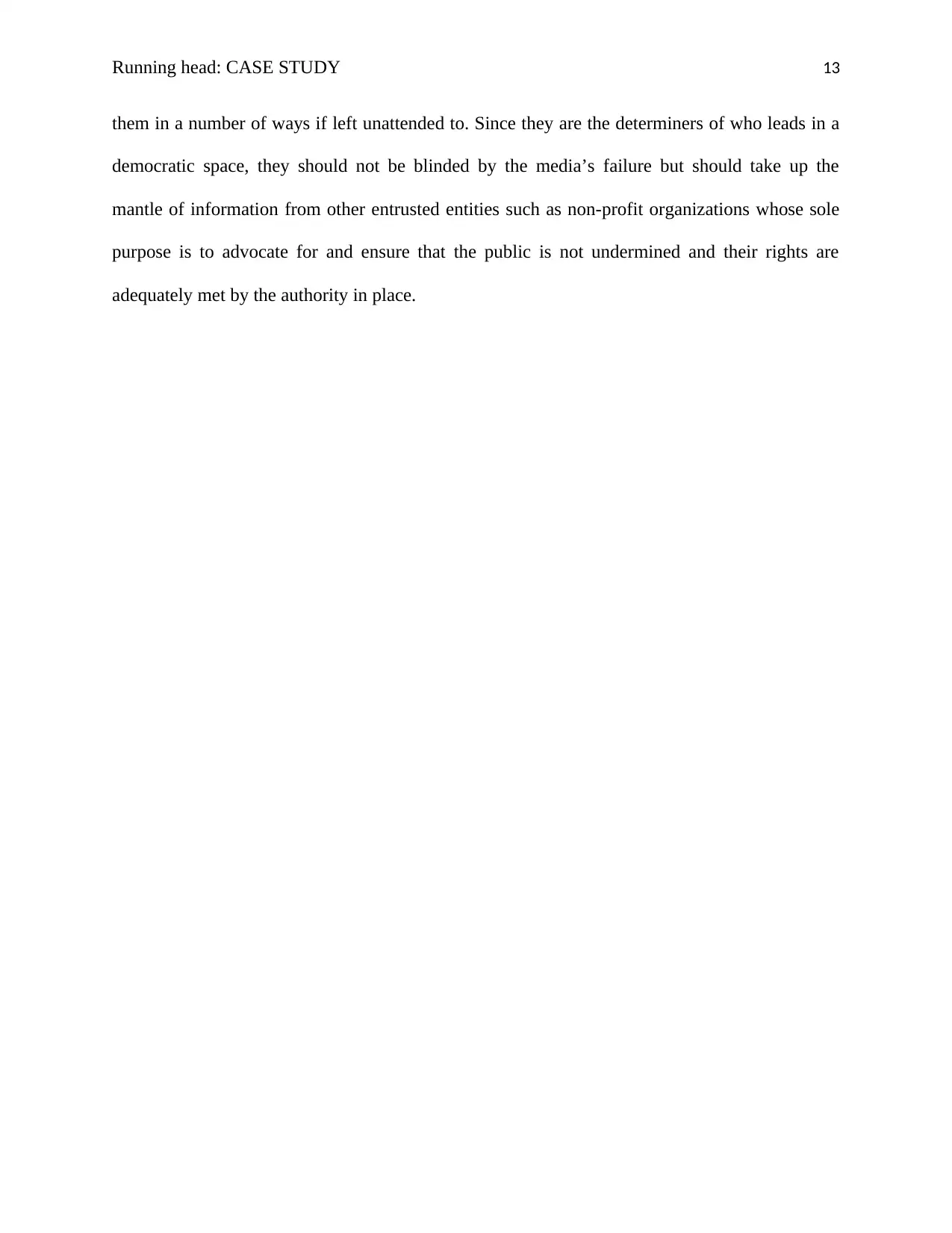
Running head: CASE STUDY 13
them in a number of ways if left unattended to. Since they are the determiners of who leads in a
democratic space, they should not be blinded by the media’s failure but should take up the
mantle of information from other entrusted entities such as non-profit organizations whose sole
purpose is to advocate for and ensure that the public is not undermined and their rights are
adequately met by the authority in place.
them in a number of ways if left unattended to. Since they are the determiners of who leads in a
democratic space, they should not be blinded by the media’s failure but should take up the
mantle of information from other entrusted entities such as non-profit organizations whose sole
purpose is to advocate for and ensure that the public is not undermined and their rights are
adequately met by the authority in place.
Paraphrase This Document
Need a fresh take? Get an instant paraphrase of this document with our AI Paraphraser
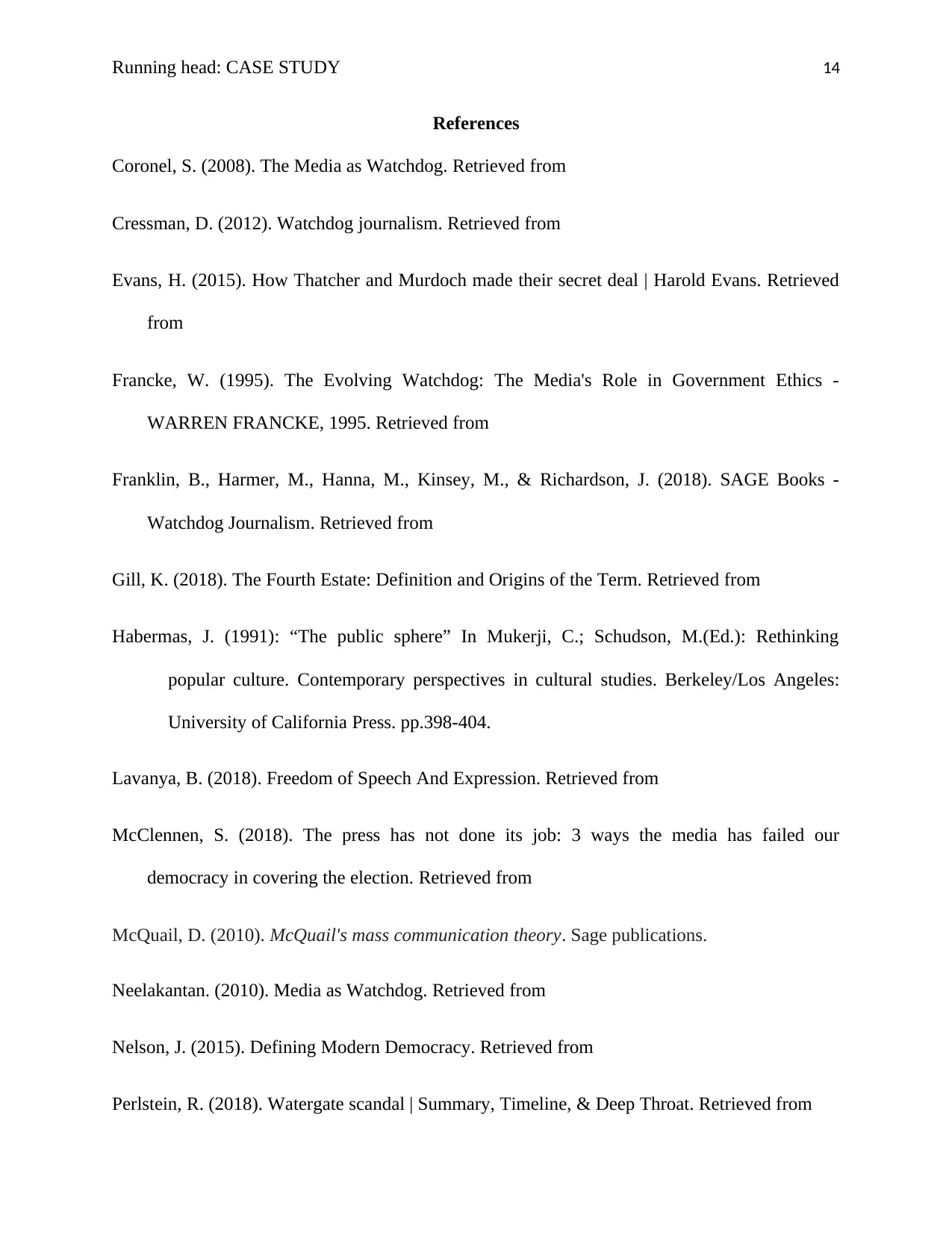
Running head: CASE STUDY 14
References
Coronel, S. (2008). The Media as Watchdog. Retrieved from
Cressman, D. (2012). Watchdog journalism. Retrieved from
Evans, H. (2015). How Thatcher and Murdoch made their secret deal | Harold Evans. Retrieved
from
Francke, W. (1995). The Evolving Watchdog: The Media's Role in Government Ethics -
WARREN FRANCKE, 1995. Retrieved from
Franklin, B., Harmer, M., Hanna, M., Kinsey, M., & Richardson, J. (2018). SAGE Books -
Watchdog Journalism. Retrieved from
Gill, K. (2018). The Fourth Estate: Definition and Origins of the Term. Retrieved from
Habermas, J. (1991): “The public sphere” In Mukerji, C.; Schudson, M.(Ed.): Rethinking
popular culture. Contemporary perspectives in cultural studies. Berkeley/Los Angeles:
University of California Press. pp.398-404.
Lavanya, B. (2018). Freedom of Speech And Expression. Retrieved from
McClennen, S. (2018). The press has not done its job: 3 ways the media has failed our
democracy in covering the election. Retrieved from
McQuail, D. (2010). McQuail's mass communication theory. Sage publications.
Neelakantan. (2010). Media as Watchdog. Retrieved from
Nelson, J. (2015). Defining Modern Democracy. Retrieved from
Perlstein, R. (2018). Watergate scandal | Summary, Timeline, & Deep Throat. Retrieved from
References
Coronel, S. (2008). The Media as Watchdog. Retrieved from
Cressman, D. (2012). Watchdog journalism. Retrieved from
Evans, H. (2015). How Thatcher and Murdoch made their secret deal | Harold Evans. Retrieved
from
Francke, W. (1995). The Evolving Watchdog: The Media's Role in Government Ethics -
WARREN FRANCKE, 1995. Retrieved from
Franklin, B., Harmer, M., Hanna, M., Kinsey, M., & Richardson, J. (2018). SAGE Books -
Watchdog Journalism. Retrieved from
Gill, K. (2018). The Fourth Estate: Definition and Origins of the Term. Retrieved from
Habermas, J. (1991): “The public sphere” In Mukerji, C.; Schudson, M.(Ed.): Rethinking
popular culture. Contemporary perspectives in cultural studies. Berkeley/Los Angeles:
University of California Press. pp.398-404.
Lavanya, B. (2018). Freedom of Speech And Expression. Retrieved from
McClennen, S. (2018). The press has not done its job: 3 ways the media has failed our
democracy in covering the election. Retrieved from
McQuail, D. (2010). McQuail's mass communication theory. Sage publications.
Neelakantan. (2010). Media as Watchdog. Retrieved from
Nelson, J. (2015). Defining Modern Democracy. Retrieved from
Perlstein, R. (2018). Watergate scandal | Summary, Timeline, & Deep Throat. Retrieved from
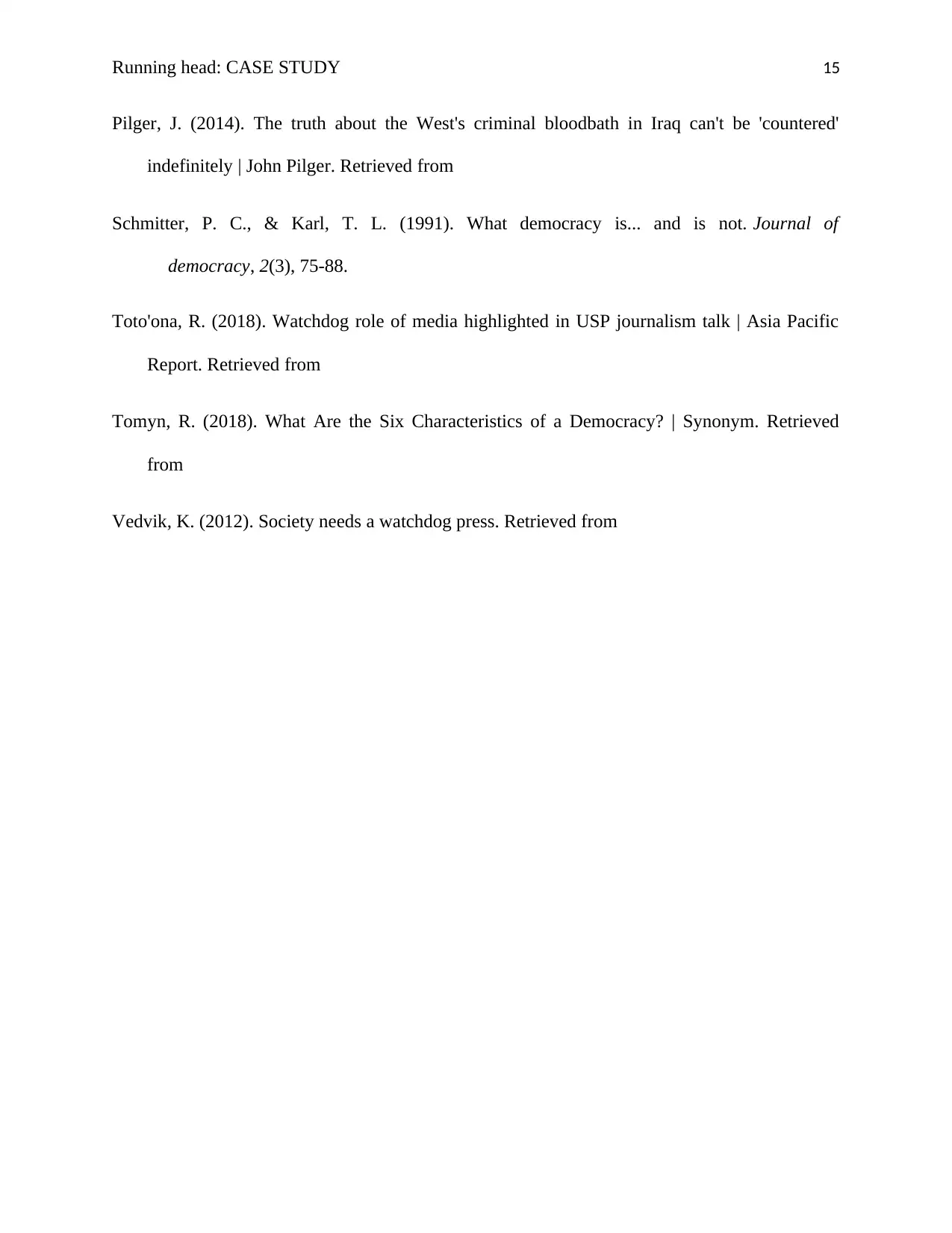
Running head: CASE STUDY 15
Pilger, J. (2014). The truth about the West's criminal bloodbath in Iraq can't be 'countered'
indefinitely | John Pilger. Retrieved from
Schmitter, P. C., & Karl, T. L. (1991). What democracy is... and is not. Journal of
democracy, 2(3), 75-88.
Toto'ona, R. (2018). Watchdog role of media highlighted in USP journalism talk | Asia Pacific
Report. Retrieved from
Tomyn, R. (2018). What Are the Six Characteristics of a Democracy? | Synonym. Retrieved
from
Vedvik, K. (2012). Society needs a watchdog press. Retrieved from
Pilger, J. (2014). The truth about the West's criminal bloodbath in Iraq can't be 'countered'
indefinitely | John Pilger. Retrieved from
Schmitter, P. C., & Karl, T. L. (1991). What democracy is... and is not. Journal of
democracy, 2(3), 75-88.
Toto'ona, R. (2018). Watchdog role of media highlighted in USP journalism talk | Asia Pacific
Report. Retrieved from
Tomyn, R. (2018). What Are the Six Characteristics of a Democracy? | Synonym. Retrieved
from
Vedvik, K. (2012). Society needs a watchdog press. Retrieved from
1 out of 15
Related Documents
Your All-in-One AI-Powered Toolkit for Academic Success.
+13062052269
info@desklib.com
Available 24*7 on WhatsApp / Email
![[object Object]](/_next/static/media/star-bottom.7253800d.svg)
Unlock your academic potential
© 2024 | Zucol Services PVT LTD | All rights reserved.





